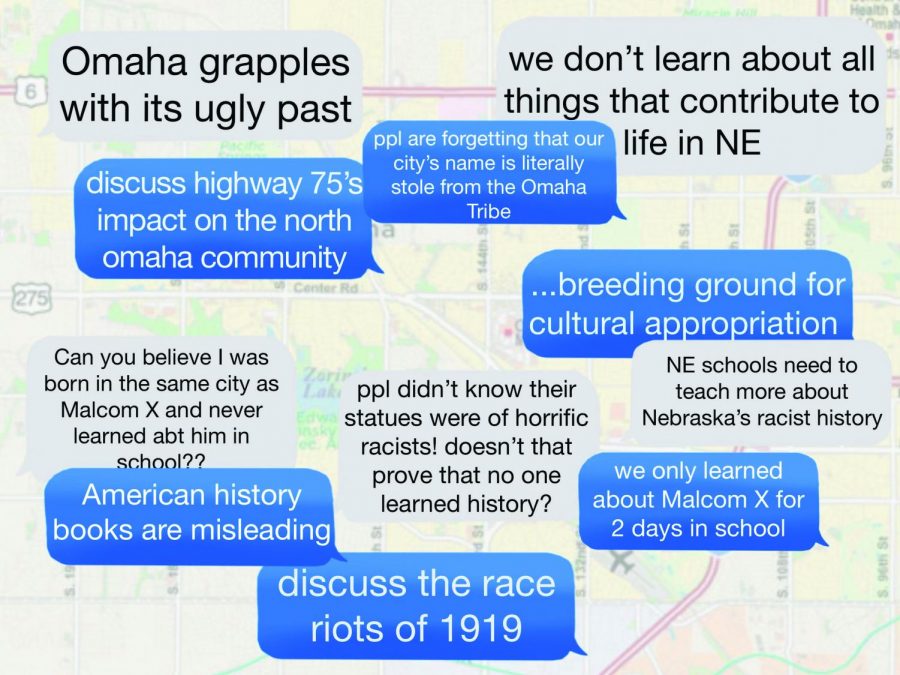Diversifying Narratives
Students, staff give their opinions on representation in curriculum
When sophomore Sarah Qaud heard the topic of Islam being brought up in her AP Human Geography class, she braced herself, ready to hear the stereotypes she faced so often. She was instead surprised to hear her teacher call out the false portrayal of Muslims in the media. After years of seeing her religion taught in a negative light, she was relieved to hear her teacher speak from an unbiased perspective.
MPS promises a diverse education for all of its students. In MPS Superintendent Jim Sutfin’s statement in June regarding racism, he said that the district plans to implement input they receive from students into the curriculum reform process and focus on elevating minority voices.
One reason for this statement was the emergence of an open letter to MPS written by Millard West alumni. In addition to concerns regarding systemic racism within MPS, they requested a review of social studies standards to ensure they cover more diverse areas.
Current students gave their opinion on concerns that they had with the English and history curriculums as well: Junior Manali Mukherjee spoke about To Kill a Mockingbird, which she read in her freshman English class. She said that while it was “undeniably well-written”, there should still be acknowledgement of its white savior complex.
“We should be reading it, but it shouldn’t be the book to teach us about race,” Mukherjee said. “We need stories from BIPOC [Black, Indigenous, and People of Color] authors also. I’m tired of hearing about people of color from white authors.”
The amount of curriculum-required books focused on POC perspectives vary from class to class. In Honors English 9, it is three of the twelve books. In English 9, it is six of the twelve.
The ultimate decision of which books are read, however, comes down to each teacher. While sophomore Keira Levering read four of the six POC perspective books in Regular English 9, junior Abbey Hess read two of the six. In junior Sammy Ward’s Honors English 9 class, she read one: To Kill a Mockingbird
English Department Head Leslie Irwin said that this may be subject to change. Books that were optional could become required when the curriculum for English is discussed in five years
“I would fully expect that there will be updated language to require a bit more [required books],” Irwin said. “We are rethinking how we do things to make a better effort towards equal representation. We would have seen more immediacy if not for the pandemic.”
When examining the social studies curriculum, while it covers many areas, there is some concern over a lack of multiple viewpoints. When Qaud found out that Abraham Lincoln was not a true abolitionist, she was surprised that she hadn’t been taught this side of him in school yet.
“The education system is responsible for the way we look at people,” Qaud said.
Social studies department head David Diehl said that while he likes to have his students read multiple perspectives, exploring the facets of every historical figure or event isn’t always possible. With so many opinions to balance within the district and limited time within a school year, it is a difficult decision to decide what to keep in and leave out.
“Every group’s story is important and deserves to be told,” Diehl said. “But what do you do when Group A’s story conflicts with Group B’s story?”
Every seven years, the district discusses the curriculum for each subject. There is a cycle for reviewing curriculum and instructional materials. This year, the focus will be on social studies.
“We have committed to listening to our students, staff, and community members as we revise the curriculum,” Associate Superintendent of Education Services Heather Phipps said.
Phipps and other teachers on a board will discuss the state curriculum standards. While she isn’t sure what will change, Phipps said diversity is “always something we consider in the process”.
So for now, both the students and staff of MPS can only wait for what changes will come.
“To find a perfect answer that pleases everybody is almost impossible,” Diehl said. “But making progress towards the good is a noble goal worth fighting [for]”


